大学英语三级语法大全 II
2016年成人英语三级考试重点短语语法二
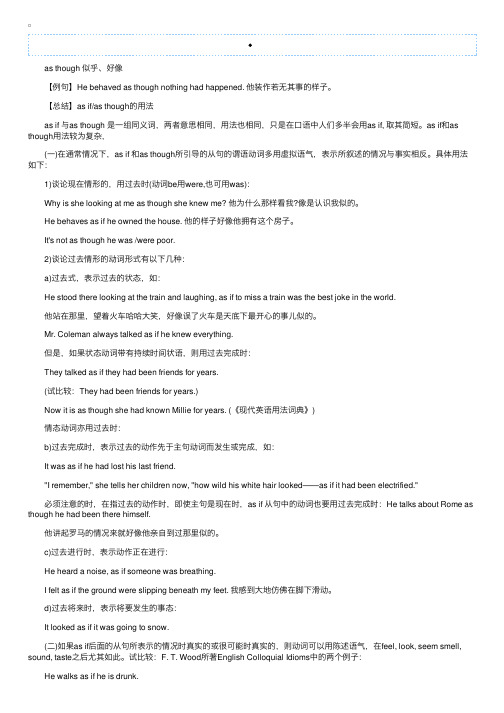
as though 似乎、好像 【例句】He behaved as though nothing had happened. 他装作若⽆其事的样⼦。
【总结】as if/as though的⽤法 as if 与as though 是⼀组同义词,两者意思相同,⽤法也相同,只是在⼝语中⼈们多半会⽤as if, 取其简短。
as if和as though⽤法较为复杂, (⼀)在通常情况下,as if 和as though所引导的从句的谓语动词多⽤虚拟语⽓,表⽰所叙述的情况与事实相反。
具体⽤法如下: 1)谈论现在情形的,⽤过去时(动词be⽤were,也可⽤was): Why is she looking at me as though she knew me? 他为什么那样看我?像是认识我似的。
He behaves as if he owned the house. 他的样⼦好像他拥有这个房⼦。
It's not as though he was /were poor. 2)谈论过去情形的动词形式有以下⼏种: a)过去式,表⽰过去的状态,如: He stood there looking at the train and laughing, as if to miss a train was the best joke in the world. 他站在那⾥,望着⽕车哈哈⼤笑,好像误了⽕车是天底下最开⼼的事⼉似的。
Mr. Coleman always talked as if he knew everything. 但是,如果状态动词带有持续时间状语,则⽤过去完成时: They talked as if they had been friends for years. (试⽐较:They had been friends for years.) Now it is as though she had known Millie for years. (《现代英语⽤法词典》) 情态动词亦⽤过去时: b)过去完成时,表⽰过去的动作先于主句动词⽽发⽣或完成,如: It was as if he had lost his last friend. "I remember," she tells her children now, "how wild his white hair looked——as if it had been electrified." 必须注意的时,在指过去的动作时,即使主句是现在时,as if 从句中的动词也要⽤过去完成时:He talks about Rome as though he had been there himself. 他讲起罗马的情况来就好像他亲⾃到过那⾥似的。
大学英语三级-2

大学英语三级-2(总分:85.00,做题时间:90分钟)一、Part Ⅰ Vocabulary and Structure(总题数:20,分数:20.00)1.It is necessary that this car ______ every week.(分数:1.00)A.to be cleanedB.be cleaned √C.cleanedD.clean解析:此处为虚拟结构,用动词原形表示,且被动。
st Friday I got very excited because I came ______ one of my best friends of my college days. (分数:1.00)A.overB.across √C.intoD.on解析:come across意为偶遇。
3.A ______ to this Problem is expected to be found before long.(分数:1.00)A.responseB.settlementC.solution √D.result解析:根据句意可知此处应填solution,意为解决。
4.If only I ______ about her coming, I would have met her at the station.(分数:1.00)A.would knowB.had known √C.have knownD.knew解析:根据句意可知,此处选B表对过去的虚拟。
5.Mary is not very ______ about money only when it comes to spending.(分数:1.00)A.sensibleB.sensitive √C.senselessD.insensitive解析:sensitive意为敏感的。
6.______ she is in London, she will ring up her old friend William.(分数:1.00)A.AsB.As soon as √C.WhileD.No sooner解析:根据句意可知选择短语as soon as...一旦立刻。
最新大学英语三级语法知识总结汇总
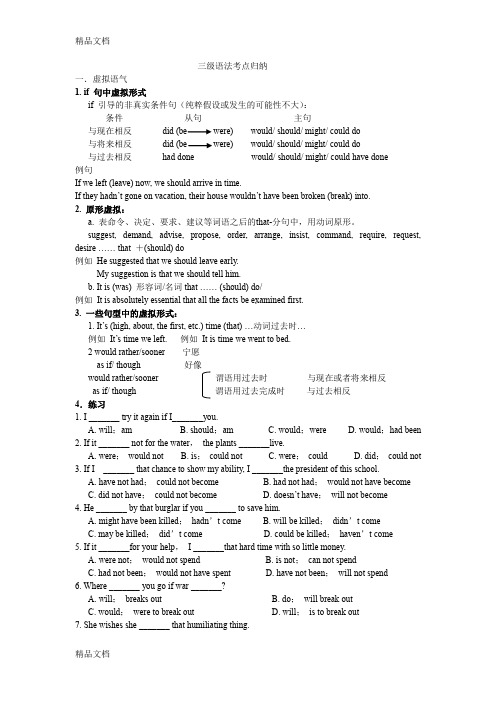
三级语法考点归纳一.虚拟语气1. if 句中虚拟形式if 引导的非真实条件句(纯粹假设或发生的可能性不大):条件从句主句与现在相反did (be were) would/ should/ might/ could do与将来相反did (be were) would/ should/ might/ could do与过去相反had done would/ should/ might/ could have done例句If we left (leave) now, we should arrive in time.If they hadn’t gone on vacation, their house wouldn’t have been broken (break) into.2. 原形虚拟:a. 表命令、决定、要求、建议等词语之后的that-分句中,用动词原形。
suggest, demand, advise, propose, order, arrange, insist, command, require, request, desire …… that +(should) do例如He suggested that we should leave early.My suggestion is that we should tell him.b. It is (was) 形容词/名词that …… (should) do/例如It is absolutely essential that all the facts be examined first.3. 一些句型中的虚拟形式:1. It’s (high, about, the first, etc.) time (that) …动词过去时…例如It’s time we left.例如It is time we went to bed.2 would rather/sooner 宁愿as if/ though 好像would rather/sooner 谓语用过去时与现在或者将来相反as if/ though 谓语用过去完成时与过去相反4.练习1. I _______ try it again if I_______you.A. will;amB. should;amC. would;wereD. would;had been2. If it _______ not for the water,the plants _______live.A. were;would notB. is;could notC. were;couldD. did;could not3. If I _______ that chance to show my ability, I _______the president of this school.A. have not had;could not becomeB. had not had;would not have becomeC. did not have;could not becomeD. doesn’t have;will not become4. He _______ by that burglar if you _______ to save him.A. might have been killed;hadn’t comeB. will be killed;didn’t comeC. may be killed;did’t comeD. could be killed;haven’t come5. If it _______for your help,I _______that hard time with so little money.A. were not;would not spendB. is not;can not spendC. had not been;would not have spentD. have not been;will not spend6. Where _______ you go if war _______?A. will;breaks outB. do;will break outC. would;were to break outD. will;is to break out7. She wishes she _______ that humiliating thing.A. doesn’t doB. didn’t doC. haven’t doneD. hadn’t done8. The chairman suggested that the meeting _______ put off.A. can beB. beC. isD. will be9. It is vital that he _______ immediately.A. should goB. must goC. goesD. went10. It is time we _______do our homework.A. begin toB. can begin toC. began toD. will begin to答案:1.选C。
大学英语三级考试常考词组和固定搭配
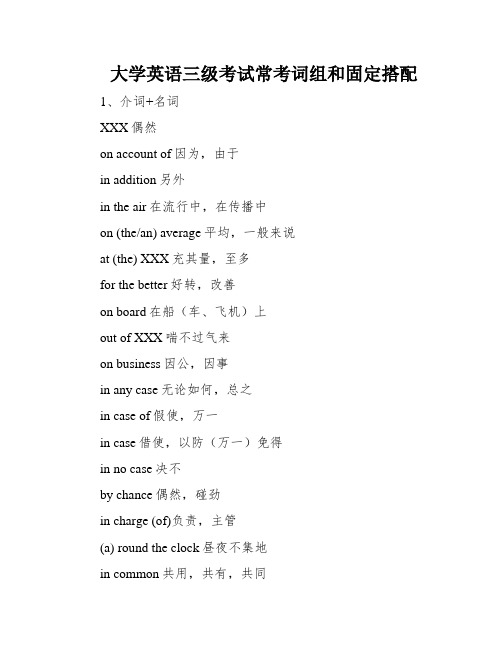
大学英语三级考试常考词组和固定搭配1、介词+名词XXX偶然on account of因为,由于in addition另外in the air在流行中,在传播中on (the/an) average平均,一般来说at (the) XXX充其量,至多for the better好转,改善on board在船(车、飞机)上out of XXX喘不过气来on business因公,因事in any case无论如何,总之in case of假使,万一in case借使,以防(万一)免得in no case决不by chance偶然,碰劲in charge (of)负责,主管(a) round the clock昼夜不集地in common共用,共有,共同XXX末了,总之in confidence信任in connection with/to关于XXX因此,结果on the contrary反之,正相反out of control失去控制under control被控制住at all costs不惜任何代价in the course of在...过程中,在...期间of course当然,自然XXX在危险中,告急out of danger脱离危险out of date过期(时)的up to date时新的XXX欠债in detail详细地in difficulties处境艰巨in the distance在远处off XXX下班on XXX值班,上班on XXX究竟,到底at all events无论如何in any event有效;实践上in the event of万一,如果发生for example例如in the face of面临,不顾,即使in fact其实,实际上on fire烧着on foot步行in force有效;实施中in favo(u)r of有利于,赞成,撑持in (the) future今后,将来on XXX警惕,防范in general平日,大致上in half成两半at hand在手边,在附近XXX彻着彻尾,完整by hand用手hand down to往下传,传给(后代)hand in hand手拉手,携手in hand在掌握中,在控制中on hand在手边,邻近at heart在内心;本色上XXX牢记,凭记忆at home在家,在国内;自在,自如XXX以名望包管XXX匆忙地,立即for instance例如,举例说at intervals不时,时时at last最终,终于at least至少,最低限度in the least一点,丝毫XXX终于,最后;详细地in the light of按照,根据in line成一直线,排成一行as a matter of fact其实,事实上by all means无论如何,必定by means of借助于,用by no means决不in memory of纪念by mistake毛病地XXX现在,此刻for a moment片刻,一会儿for the XXX现在,暂时XXX立刻,立时in nature本质上XXX有时,不时XXX秩序井然,整齐in order to以便,为了XXX以便out of order发生故障,失调on one's own独自地,独立地in particular出格地,出格,具体地in XXX在曩昔,以往XXX亲自XXX在适当的位置in place of代替in the first place起初,首先in the last place末了out of place不得其所的,不适当的to the point切中要害,切题in practice在实际中,实际上out of practice久不练,荒疏XXX目前,现在for the present现在,临时in public公开地,当众for (the) purpose of为了on purpose故意,有意with the purpose of为了XXX正在斟酌XXX随便地,任意地at any rate无论如何,至少XXX由于as regards关于,至于XXX关系到XXX关于as a result结果,因此in return作为报答,作为回报on XXX在旅途中as a rule规章,规则;通常,照例in the long run最终,从长远观点看on sale出卖;贱卖on a large scale大范围地on a small scale小规模地in secret隐秘地,私下地in sense从某种意义上说in shape处于良好状态on the side作为兼职,分外at first sight乍一看,初看起来XXX被看到,在望out of sight看不见,在视野以外in spite of不论,不顾;尽管,固然on the spot当场,在现场in step同步,合拍out of step步调不一致,不协调in stock现有,备有in sum总而言之XXX流着泪,含泪,哭intermsof根据,依照;用...措词forone XXX首先,一则on the second XXX经重新斟酌,一转念XXX每次,一次XXX从不,决不XXX同时,曾经,早年曾at the same time但是,然而XXX有时for the time being现在,临时from time to time有时,不时in no time立即,马上in time及时,适时地on time准时out of touch失去联系XXX事实上,实践上,切实实在XXX试穿by XXX轮流,交替in turn依次,轮流in XXX徒劳,无效a variety of种种,各种by virtue of由于by XXX顺便提一下,另外in a way在某点,在某种水平上in no way决不in the way of妨碍in one's/the way妨碍,障碍after a while过了一会,不久for a while临时,一时on the whole总的来说in a word一句话at work上班out of work失业,下岗in the world2、动词+名词have/gain access to可以获得have/gain an advantage over胜过,优于pay attention to注意do/try one's best极力,勉力get the best of赛过make the best of充分使用,妥帖处置惩罚get the better of打败,智胜XXX屏息,歇口吻take care小心,留神take care of照顾,照料XXX冒险一试XXX担负,负责with delight怅然,乐意地make a /the difference有影响,很紧张carry/bring into effect使生效,使起作用put into effect实行,生效come/go into effect生效,实施take effect生效,起感化catch one's eye引人注目keep an eye on留神,照看make a face做鬼脸find fault埋怨,挑剔catch fire着火come/go into force生效,实施make XXX交朋友,友好相处make fun of取笑,嘲弄keep one's head保持镇静XXX不知所措lose heart丧失勇气,失去自信心get/learn by heart记住,背诵get hold of捉住,把握keep house管理家务,做家务throw/cast light on使认识打听,阐明XXX记住have in XXX记住,考虑到,想到make up one's XXX下决计come/go into operation使投入生产,使运转put in order整理,检修play a part起作用take place产生,举行take the place of代替come to the point说到要点,扼要地说bring/carry into practice实施,实行make progress进步,进展give rise to引起,使产生make sense讲得通,有意义catch the sight of发现,突然看见(go) on the stage当演员take one's time不急不忙,从容进行keep in touch保持接洽keep XXX通晓事态,注意动向XXX失去联系make use of利用put to use使用,使用give way让路,让步lead the way带路,引路make one's way前进,进行make way让路,开路keep one's word遵守诺言action on作用XXX呼吁,要求XXX,勉力XXX态度,看法a great/ good deal of大量(的),很多(的)influence on影响interference in干预interference with妨碍,打扰XXX引见a lot (of)许多(的),大量(的)lots of大量,很多fall in love with相爱,爱上a number of若干,许多reply to回答,答复a series of一系列,一连串3、名词词组的其他形式trolley bus电车I.D. card身份证credit card信用卡no doubt无疑,必定XXX隔邻out of doors在户外face to face面对面地XXX fact实际情况,真相a few有些,几个quite a few还不少,有相当数目的a little一点,稍,一些,少许little by little逐渐的quite a little相当多,不少no matter无论no more不再fair play公平竞赛,公平看待XXX有需求,销路好rest room厕所,盥洗室XXXside by side肩并肩,一个挨一个heart and soul一心一意step by step逐步ahead of time提前all the time一直,一直once upon a time从前once in a while偶尔,有时no wonder难怪,怪不得word for word逐字地。
大学英语三级考试语法复习要点总结
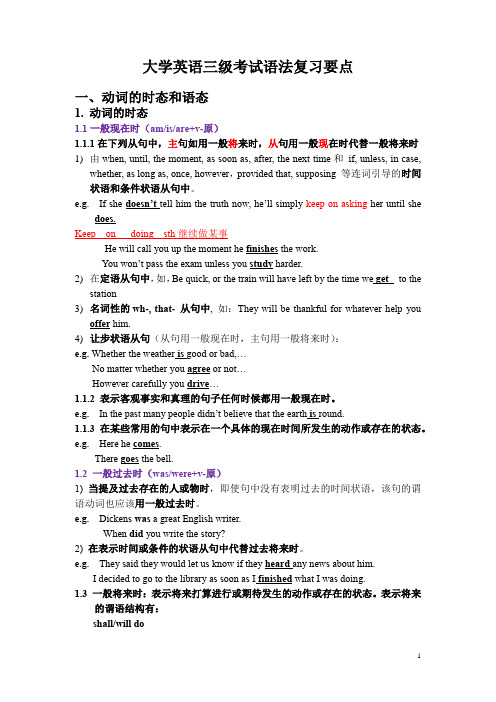
大学英语三级考试语法复习要点一、动词的时态和语态1. 动词的时态1.1一般现在时(am/is/are+v-原)1.1.1在下列从句中,主句如用一般将来时,从句用一般现在时代替一般将来时1)由when, until, the moment, as soon as, after, the next time和if, unless, in case,whether, as long as, once, however,provided that, supposing 等连词引导的时间状语和条件状语从句中。
e.g. If she doesn’t tell him the truth now, he’ll simply keep on asking her until shedoes.Keep on doing sth继续做某事He will call you up the moment he finishes the work.You won’t pass the exam unless you study harder.2)在定语从句中,如,Be quick, or the train will have left by the time we get to thestation3)名词性的wh-, that-从句中, 如:They will be thankful for whatever help youoffer him.4)让步状语从句(从句用一般现在时,主句用一般将来时):e.g. Whether the weather is good or bad,…No matter whether you agree or not…However carefully you drive…1.1.2 表示客观事实和真理的句子任何时候都用一般现在时。
e.g.In the past many people didn’t believe that the earth is round.1.1.3 在某些常用的句中表示在一个具体的现在时间所发生的动作或存在的状态。
大学英语精读第三册第二单元讲义

大学英语精读第三册第二单元讲义Unit 2 Book 3I. Words and Expressions1. hold on: continue in spite of difficulties*Despite all the hardships, he held on to his pursuit of further study abroad.在经济衰退时期我们要把业务坚持下去。
(=We should hold on to our business during the recession.)2. defy: vt.(1) to make impossible or unsuccessful*This problem defied solution. 此问题无法解决。
那个恐怖的场景难以描述。
(=That horrible scene defied any description.)(2) to refuse to obey(=They defied their parents and got married.)这些无视法律的罪犯终于得到了惩罚。
(=These criminals who had defied the law were eventually punished.)Collocations:defy the authority反抗权威defy the government蔑视政府defy severe cold不畏严寒defy enumeration不胜枚举defy laws human and divine无法无天CF. oppose, defy & resist这些动词均含有“反抗”、“抵抗”之意。
oppose 普通用词,可表不同程度的抵抗。
defy 指公开地、勇敢地反对或抵抗,有时含公然挑衅之意。
resist 指积极地反抗一种攻击、暴力或诱惑。
(Directions:) Fill in the blanks with the words above. Change the form where necessary.(1) Our troopers are _______ the enemies’ atta cks.(=resisting)(2) This new plan has been stubbornly ______ since it was put forward. (=opposed)(3) The little boy couldn’t ______ the temptation and ate up all the cake. (=resist)(4) He _____ the court order by leaving the country. (=defied)3. overwhelming: adj. overpowering in effect or strength*The girl screamed with overwhelming joy at the sight of her birthday present, a pink dress.巨大的压力终于让他精神崩溃了。
(完整版)成人英语三级语法知识大全,推荐文档

成人英语三级语法知识大全一、句法分析 (2)二、词法分析 (3)三、时态 (9)四、被动语态 (12)五、情态动词 (13)六、不定式 (15)七、定语从句 (18)八、主语从句 (23)九、表语从句 (24)十、宾语从句 (24)十一、同位语从句 (25)十二、状语从句 (26)十三、虚拟语气 (29)十四、动名词 (32)十五、现在分词 (32)十六、过去分词 (36)十七、独立主格结构 (38)十八、倒装句型 (39)十九、强调句型 (40)二十、主谓一致 (41)二十一、It的用法 (43)一、句法分析1、主语:是句子要说明的人或物,可以作主语的成分有名词,主语一般在句首。
注意名词单数形式常和冠词不分家!1) Mr. Lee is a well-known scientist.名词作主语2) He reads newspapers everyday.代词作主语3) Two and ten is twelve.数词作主语4) Smoking is harmful to the health.动名词作主语5) To swim in that pool is a great pleasure.动词不定式作主语6) What we shall do next is not yet decided.从句作主语2、谓语: 说明主语的动作,状态或特征1) The new term begins on the 1st of September.2) His father is an engineer.3) She seemed happy.4) Li Hua showed me his album.3、宾语:指的是及物动词涉及到的人或物1) Wang Ling lent me a novel to read in the bus.2) The medicine is good for a cold.3) How many pieces do you want?4) My little sister always likes to ask questions.5) Would you mind coming earlier tomorrow?6) He asked me what I was going to do tonight4、宾语补足语:在宾语后面补充说明宾语的动作、状态、特征。
大学英语三级语法大全

大学英语三级语法大全名词性从句概述名词性从句在句子中起名词作用的句子叫名词从句 (Noun Clauses)。
名词从句的功能相当于名词词组, 它在复合句中能担任主语、宾语、表语、同位语、介词宾语等,因此根据它在句中不同的语法功能,名词从句又可分别称为主语从句、宾语从句、表语从句和同位语从句。
引导名词性从句的连接词引导名词性从句的连接词引导名词性从句的连接词可分为三类:连接词:that, whether, if(不充当从句的任何成分)连接代词:what, whatever, who, whoever, whom, whose, which.连接副词:when, where, how, why不可省略的连词:1. 介词后的连词2. 引导主语从句和同位语从句的连词不可省略。
What she was chosen made us very happy.We heard the news that our team had won.比较:whether与if 均为"是否"的意思。
但在下列情况下,whether 不能被if 取代:1. whether引导主语从句并在句首2. 引导表语从句3. whether从句作介词宾语4. 从句后有"or not"Whether he will come is not clear.大部分连接词引导的主语从句都可以置于句末,用 it充当形式主语。
It is not important who will go.It is still unknown which team will win the match.名词性wh-从句名词性wh-从句1)由wh-词引导的名词从句叫做名词性wh-从句。
Wh-词包括who, whom,. whose, whoever, what, whatever, which, whichever等连接代词和where, when, how, why等连接副词。
大学英语三级语法知识总结汇总.doc

三级语法考点归纳一.虚拟语气1.if 句中虚拟形式if 引导的非真实条件句(纯粹假设或发生的可能性不大):条件从句主句与现在相反did (be were)would/ should/ might/ could do与将来相反did (be were)would/ should/ might/ could do与过去相反had done would/ should/ might/ could havedone例句If we left (leave) now, we should arrive in time.If they hadn’ t gone on vacation, their house wouldn’ t have been broken (break) into.2. 原形虚拟:a. 表命令、决定、要求、建议等词语之后的 that- 分句中,用动词原形。
suggest,demand, advise, propose, order, arrange, insist, command, require,request, desire+that(should) do例如 He suggested that we should leave early.My suggestion is that we should tell him.b. It is (was) 形容词 / 名词 that(should) do/例如 It is absolutely essential that all the facts be examined first.3.一些句型中的虚拟形式:1. It’ s (high, about, the first, etc.) time (that)动词过去时例如 It ’s time we left. 例如 It is time we went to bed.2 would rather/sooner宁愿as if/ though好像would rather/sooner谓语用过去时与现在或者将来相反as if/ though 谓语用过去完成时与过去相反4.练习1. I _______ try it again if I_______you.A. will ; amB. should; amC. would ; wereD.would ; had been2. If it _______ not for the water, the plants _______live.A. were; would notB. is; could notC. were; couldD. did;could not3.If I _______ that chance to show my ability, I _______the president of this school.A. have not had; could not becomeB. had not had; would not havebecomeC. did not have; could not becomeD. doesn’thave;will not become4. He _______ by that burglar if you _______ to save him.A. might have been killed; hadn’t comeB. will be killed; didn’t comeC. may be killed; did’t comeD. could be killed; haven’t come5. If it _______for your help, I _______that hard time with so little money.A. were not; would not spendB. is not; can not spendC. had not been; would not have spentD. have not been; will not spend6. Where _______ you go if war _______A. will; breaks outB. do; will break outC. would; were to break outD. will; is to break out7. She wishes she _______ that humiliating thing.A. doesn’t doB. didn’ t doC. haven’ t doneD. hadn’t done8. The chairman suggested that the meeting _______ put off.A. can beB. beC. isD. will be9. It is vital that he _______ immediately.A. should goB. must goC. goesD. went10. It is time we _______do our homework.A. begin toB. can begin toC. began toD. will begin to答案:1.选 C。
全国公共英语三级常见语法

第一节动词的时态一、一般现在时:1、由when、as soon as、the minute、the moment、till、until等引起的时间状语从句,以及由if、unless、provided that等引起的条件状语从句常常用一般现在时态表示将来的动作,而主句则用一般将来时态。
例:They will go home for winter vocation as soon as they finish their exams。
2、当表示普遍的真理或者众所周知的客观事实,常常用一般现在时态。
例:The earth is round。
地球是圆的.二、一般过去时:区分三个短语的用法:1、used to do sth:过去常常做某事。
2、be/get used to doing sth:习惯做某事。
3、be used to do sth:被用于做某事.三、一般将来时:1、be to+动词原形:表示安排或计划好了的动作。
例:The Third-Ring Road is to be open to traffic before National Day.2、be about to+动词原形:表示即将发生的动作。
例:The lecture is about to begin。
讲座即将开始。
3、一些表示动作趋势,如开始、终结,以及一些表示动作方向,如往来的动词,常常用现在进行时态表示按照安排将于将来发生的事情,这类动词常见的有如:start,go,leave,come,arrive等.例:We are leaving for Beijing tomorrow. 我们明天动身去北京。
四、进行时态:重点区分when和while引起的时间状语的用法。
When表示时间上的点,在考试中其引导的时间状语从句多翻译为“这时?”,主句多用进行时态;while引导的时间状语从句多翻译为“正当……时”,该从句用进行时态. 例:One of the guards was sleeping when the general came in, which made him very angry。
大学英语三级考试语法总结

( 2 ) 用 在 advisable ( 可 取 的 、 明 智 的 ) , desirable (称心合意的) , essential (必要的、 必 不 可 少 的 ) , important, impossible, necessary, proper等形容词后的that-分句中。
2019/2/26
23
5. It was not such a good job ____ she had read about in the advertisement.
A. like
B. which
C. as
D. what
2019/2/26
24
状语从句 1. 时间状语从句
含义
词例
当…时候
when, while , as
2019/2/26 12
练习题: 1. This ATM has been out of service for a few days. It should __________ last week. A. fix B. be fixed
C. have fixed D. have been fixed
2019/2/26 16
形容词性从句 定语从句 • 一、形容词性从句概要
• 定义:形容词性从句一般称为定语从句,在句 子中起定语作用,修饰一个名词或代词,有时 可修饰一个句子。
• 结构:被定语从句修饰的词叫先行词。定语从 句必须放在先行词的后面,由关系词引导。 • 先行词+关系词+定语从句
2019/2/26 17
• 注意点: 条件从句中省略if 采用倒装语序 的情况 • 在if引导的表示虚拟的条件状语从句中,有 时可以把含有助动词、情态动词、be或 have的虚拟条件句中的连词if 省去,而将 had ,should,were 等词提到主语之前, 即用倒装结构。
大学英语三级考试语法总结
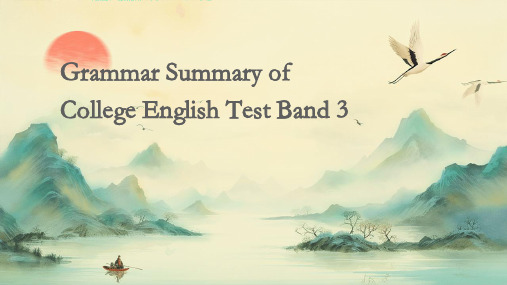
Verb
• Summary words: Verbs are words that indicate actions, states, or existence.
• Detailed description: Verbs can be divided into transitive verbs and intransitive verbs. Transitive verbs can be directly followed by an object, while intransitive verbs cannot be directly followed by an object. Verbs can also be divided into regular verbs and irregular verbs. The past tense and past participle forms of regular verbs can be formed by adding the - ed suffix, while irregular verbs have no fixed rules of variation. In addition, there are some special types of verbs such as auxiliary verbs and modal verbs.
"I eat an apple every day.", "She studies hard."
Past tense
Summary
The past tense is used to describe actions and situations that happened in the past
大学英语三级语法大全-II

大学英语三级语法大全II倒装:倒装句之全部倒装全部倒装是只将句子中的谓语动词全部置于主语之前。
此结构通常只用于一般现在时和一般过去时。
常见的结构有:1)here,there,now,then,thus等副词置于句首,谓语动词常用be,come,go,lie,run等表示来去或状态的动词。
例如:Then came the chairman. 那时总裁来了。
Here is your letter. 你的信。
2)表示运动方向的副词或地点状语置于句首,谓语表示运动的动词。
例如:Out rushed a missile from under the bomber. 轰炸机肚底下窜出一枚导弹。
Ahead sat an old woman. 前面坐着一个老妪。
注意:上述全部倒装的句型结构的主语必须是名词,如果主语是人称代词则不能完全倒装。
例如:Here he comes. 他来了。
Away they went. 他们走开了。
倒装:以否定词开头作部分倒装否定词如Not only…but also,Hardly/Scarcely…when,No sooner…than等放在句首,后面要用倒装。
例如:Not only did he refuse the gift,he also severely criticized the sender.他没有收下礼物,还狠狠批评了送礼的人。
Hardly had she gone out when a student came to visit her. 她刚出门,就有个学生来访。
No sooner had she gone out than a student came to visit her. 她刚出门,就有个学生来访。
典型例题No sooner___ than it began to rain heavily.A. the game beganB.has the game begunC. did the game beginD.had the game begun答案D. 以具有否定意义的副词放在句首时,一般采用倒装句(谓语前置)。
大学英语三级考试语法总结
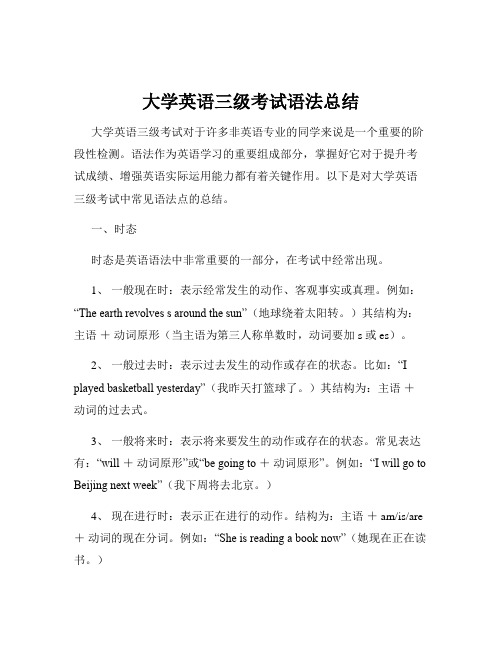
大学英语三级考试语法总结大学英语三级考试对于许多非英语专业的同学来说是一个重要的阶段性检测。
语法作为英语学习的重要组成部分,掌握好它对于提升考试成绩、增强英语实际运用能力都有着关键作用。
以下是对大学英语三级考试中常见语法点的总结。
一、时态时态是英语语法中非常重要的一部分,在考试中经常出现。
1、一般现在时:表示经常发生的动作、客观事实或真理。
例如:“The earth revolves s around the sun”(地球绕着太阳转。
)其结构为:主语+动词原形(当主语为第三人称单数时,动词要加 s 或 es)。
2、一般过去时:表示过去发生的动作或存在的状态。
比如:“I played basketball yesterday”(我昨天打篮球了。
)其结构为:主语+动词的过去式。
3、一般将来时:表示将来要发生的动作或存在的状态。
常见表达有:“will +动词原形”或“be going to +动词原形”。
例如:“I will go to Beijing next week”(我下周将去北京。
)4、现在进行时:表示正在进行的动作。
结构为:主语+ am/is/are +动词的现在分词。
例如:“She is reading a book now”(她现在正在读书。
)5、过去进行时:表示过去某个时刻正在进行的动作。
其结构为:主语+ was/were +动词的现在分词。
如:“I was watching TV at eighto'clock last night”(昨晚八点我正在看电视。
)6、现在完成时:表示过去发生的动作对现在造成的影响或结果,或者过去开始一直持续到现在的动作。
结构为:主语+ have/has +过去分词。
比如:“I have finished my homework”(我已经完成了作业。
)7、过去完成时:表示过去某个时间之前已经完成的动作。
结构为:主语+ had +过去分词。
例如:“By the end of last year, we had learned 2000 words”(到去年年底,我们已经学了 2000 个单词。
- 1、下载文档前请自行甄别文档内容的完整性,平台不提供额外的编辑、内容补充、找答案等附加服务。
- 2、"仅部分预览"的文档,不可在线预览部分如存在完整性等问题,可反馈申请退款(可完整预览的文档不适用该条件!)。
- 3、如文档侵犯您的权益,请联系客服反馈,我们会尽快为您处理(人工客服工作时间:9:00-18:30)。
大学英语三级语法大全II倒装:倒装句之全部倒装全部倒装是只将句子中的谓语动词全部置于主语之前。
此结构通常只用于一般现在时和一般过去时。
常见的结构有:1)here,there,now,then,thus等副词置于句首,谓语动词常用be,come,go,lie,run等表示来去或状态的动词。
例如:Then came the chairman. 那时总裁来了。
Here is your letter. 你的信。
2)表示运动方向的副词或地点状语置于句首,谓语表示运动的动词。
例如:Out rushed a missile from under the bomber. 轰炸机肚底下窜出一枚导弹。
Ahead sat an old woman. 前面坐着一个老妪。
注意:上述全部倒装的句型结构的主语必须是名词,如果主语是人称代词则不能完全倒装。
例如:Here he comes. 他来了。
Away they went. 他们走开了。
倒装:以否定词开头作部分倒装否定词如Not only…but also,Hardly/Scarcely…when,No sooner…than等放在句首,后面要用倒装。
例如:Not only did he refuse the gift,he also severely criticized the sender.他没有收下礼物,还狠狠批评了送礼的人。
Hardly had she gone out when a student came to visit her. 她刚出门,就有个学生来访。
No sooner had she gone out than a student came to visit her. 她刚出门,就有个学生来访。
典型例题No sooner___ than it began to rain heavily.A. the game beganB.has the game begunC. did the game beginD.had the game begun答案D. 以具有否定意义的副词放在句首时,一般采用倒装句(谓语前置)。
这类表示否定意义的词有never,seldom,scarcely,little,few,not,hardly,以及not only…but (also),no sooner…than,hardly…when scarcely…when等等。
注意:只有当Not only…but also连接两个分句时,才在第一个分句用倒装结构。
如果置于句首的Not only…but also仅连接两个并列词语,不可用倒装结构,如Not only you but also I am fond of music.倒装:倒装句之部分倒装部分倒装是指将谓语的一部分如助动词或情态倒装至主语之前。
如果句子的谓语没有助动词或情态动词,则需添加助动词do,does或did,并将其置于主语之前。
1)句首为否定或半否定的词语,如no,not,never,seldom,little,hardly,at no time,in no way,not until…等。
例如:Never have I seen such a performance. 从未见过如此糟糕的表演。
Nowhere will you find the answer to this question. 无论如何你不会找到这个问题的答案的。
Not until the child fell asleep did the mother leave the room. 母亲一直到孩子入睡后离开房间。
当Not until引出主从复合句,主句倒装,从句不倒装。
注意:如否定词不在句首不倒装。
例如:I have never seen such a performance.The mother didn't leave the room until the child fell asleep.典型例题1)Why can't I smoke here?At no time___ in the meeting-roomA. is smoking permittedB.smoking is permittedC. smoking is it permittedD.does smoking permit答案A. 这是一个倒装问题。
当否定词语置于句首以表示强调时,其句中的主谓须用倒装结构。
这些否定词包括no,little,hardly,seldom,never,not only,not until等。
本题的正常语序是Smoking is permitted in the meeting-room at no time.2)Not until the early years of the 19th century ___ what heat is.A. man did knowB. man knowC. didn't man knowD. did man know答案D.看到Not until…的句型,我们知道为一倒装句,答案在C,D 中选一个。
改写为正常语序为,Man did not know what heat is until the early years of the 19th. 现在将not提前,后面就不能再用否定了,否则意思就变了。
倒装:only在句首倒装的情况Only in this way,can you learn English well. 只有这样,你才能学好英语。
Only after being asked three times did he come to the meeting. 叫了三次,他才来参加会议。
如果句子为主从复合句,则主句倒装,从句不倒装。
例如:Only when he is seriously ill does he ever stay in bed. 病得狠重时,他才卧床休息。
倒装:so, neither, nor作部分倒装用这些词表示"也"、"也不" 的句子要部分倒装。
例如:Tom can speak French. So can Jack. 汤姆会讲法语,杰克也会。
If you won't go,neither will I.你不去,我也不去。
典型例题——Do you know Jim quarrelled with his brother?——I don't know,_____.A. nor don't I careB. nor do I careC. I don't care neitherD. I don't care also答案:B. nor为增补意思"也不关心",因此句子应倒装。
A错在用don't 再次否定,C neither 用法不对且缺乏连词。
D缺乏连词。
注意:当so引出的句子用以对上文内容加以证实或肯定时,不可用倒装结构。
意为"的确如此".例如:Tom asked me to go to play football and so I did. 汤姆邀我去踢球,我去了。
——It's raining hard.——So it is. 雨下得真大。
是呀。
倒装:as, though引导的倒装句as / though引导的让步从句必须将表语或状语提前(形容词,副词,分词,实义动词提前)。
但需注意:1)句首名词不能带任何冠词。
2)句首是实义动词,其他助动词放在主语后。
如果实义动词有宾语和状语,随实义动词一起放在主语之前。
例如:Try hard as he will,he never seems able to do the work satisfactorily. 他工作很努力,但总不能让人满意。
注意:让步状语从句中,有though,although时,后面的主句不能有but,但是though 和yet可连用。
倒装:其他部分倒装1)so…that 句型中的so 位于句首时,需倒装。
例如:So frightened was he that he did not dare to move an inch. 他害怕得很,动也不敢动。
2)在某些表示祝愿的句型中。
例如:May you all be happy. 愿你们都快乐。
3)在虚拟语气条件句中从句谓语动词有were,had,should等词,可将if 省略,把were,had,should 移到主语之前,采取部分倒装。
例如:Were I you,I would try it again. 我是你的话,就再试一次。
典型例题:1)Not until the early years of the 19th century___ what heat is.A. man did knowB. man knewC. didn't man knowD. did man know答案为D.否定词Not在句首,要求用部分倒装的句子结构。
2)Not until I began to work ___ how much time I had wasted.A. didn't I realizeB. did I realizeC. I didn't realizeD. I realize答案为B.3)Do you know Tom bought a new car?I don't know,___.A. nor don't I careB. nor do I careC. I don't care neitherD. I don't care also答案为B. 句中的nor引出部分倒装结构,表示"也不".由so,neither,nor引导的倒装句,表示前一情况的重复出现。
其中,so用于肯定句,而neither,nor 用在否定句中。
动词的时态:用于现在完成时的句型1)It is the first / second time……that…结构中的从句部分,用现在完成时。
例如:It is the first time that I have visited the city. 这是我第一次访问这城市。
This is the first time (that)I've heard him sing.这是我第一次听他唱歌。
注意:It was the third time that the boy had been late.2)This is +形容词最高级+that…结构,that 从句要用现在完成时。
